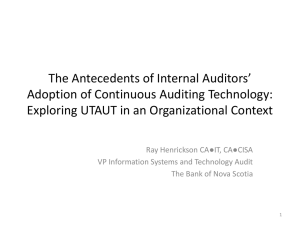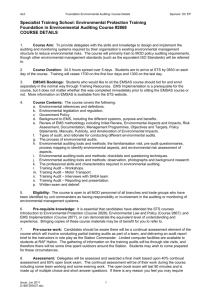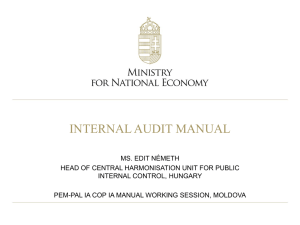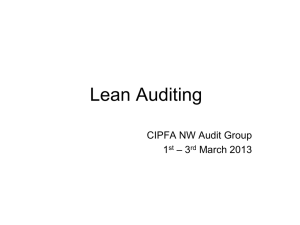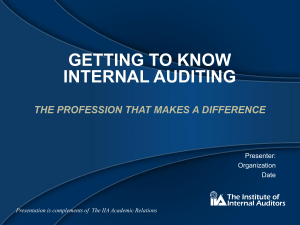Auditing Performance Management Systems
advertisement
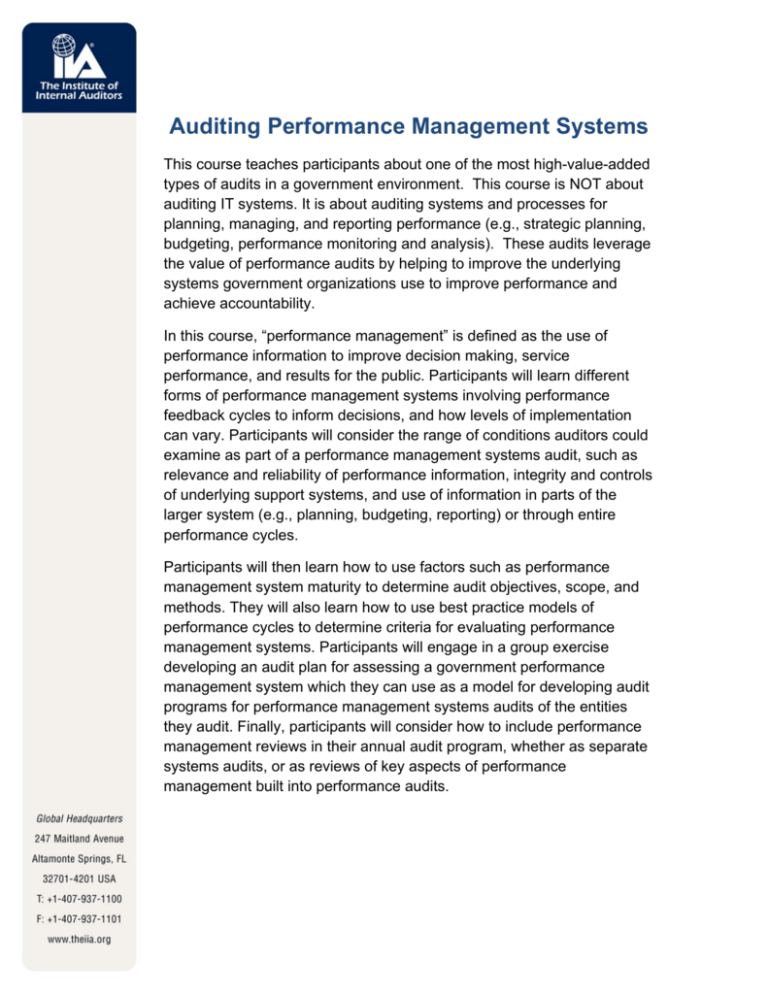
Auditing Performance Management Systems This course teaches participants about one of the most high-value-added types of audits in a government environment. This course is NOT about auditing IT systems. It is about auditing systems and processes for planning, managing, and reporting performance (e.g., strategic planning, budgeting, performance monitoring and analysis). These audits leverage the value of performance audits by helping to improve the underlying systems government organizations use to improve performance and achieve accountability. In this course, “performance management” is defined as the use of performance information to improve decision making, service performance, and results for the public. Participants will learn different forms of performance management systems involving performance feedback cycles to inform decisions, and how levels of implementation can vary. Participants will consider the range of conditions auditors could examine as part of a performance management systems audit, such as relevance and reliability of performance information, integrity and controls of underlying support systems, and use of information in parts of the larger system (e.g., planning, budgeting, reporting) or through entire performance cycles. Participants will then learn how to use factors such as performance management system maturity to determine audit objectives, scope, and methods. They will also learn how to use best practice models of performance cycles to determine criteria for evaluating performance management systems. Participants will engage in a group exercise developing an audit plan for assessing a government performance management system which they can use as a model for developing audit programs for performance management systems audits of the entities they audit. Finally, participants will consider how to include performance management reviews in their annual audit program, whether as separate systems audits, or as reviews of key aspects of performance management built into performance audits. Course Duration: 6 sessions CPE Hours Available: 16 Knowledge Level: Intermediate Field of Study: Auditing (Governmental) Prerequisites: Familiarize with any performance management systems, sub-systems, and practices (e.g., strategic planning, operations or performance planning, budgeting, performance monitoring, performance analysis and improvement, performance reporting) is useful, but not required. Advance Preparation: None Delivery Format: eSeminar Course Outline: Introduction to Auditor Roles and Government Performance Management • • • • Recognize how audits of performance management systems can be a key part of a larger framework of auditor roles and practices to improve government performance management. Describe the essential elements of performance measurement and how they provide the informational “fuel” for performance management. Define performance management, performance management systems, and performance management cycles. Describe the difference between traditional performance audits and audits of performance management systems. Auditing Strategic & Performance Planning as Part of a PM Systems Audit • • • • Develop criteria for auditing strategic and performance planning practices. Assess strengths and weaknesses of a long-term or strategic plan. Assess strengths and weaknesses of annual service performance plans. Develop survey-level audit steps for auditing strategic or performance planning. Auditing Performance Budgeting as Part of a PM Systems Audit • • • Develop criteria for auditing a performance budgeting process. Assess strengths and weaknesses of a performance budget. Develop survey-level audit steps for auditing performance budgeting. Auditing Performance Monitoring, Analysis, and Reporting • • Determine the key internal and external users of performance information Use performance reporting guidelines of standard-setting organizations as an aid in developing criteria and assessing performance reports. • Develop criteria for auditing performance monitoring, analysis, and reporting. • Develop survey-level audit steps for auditing performance monitoring, analysis, and reporting. Auditing Performance-based Decision Making in a PM Systems Audit • • • Develop objectives and criteria for auditing performance-based decision making. Use a strategic performance budget decision model to assess use of performance information in resource allocation decisions. Develop survey-level audit steps for auditing performance-based decision making, which, combined with the audit steps developed in Units 2-4, will complete an audit plan that can be used as a model for actual audits of performance management systems.


